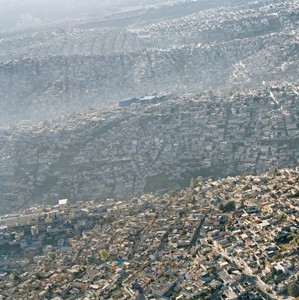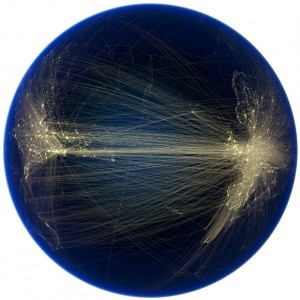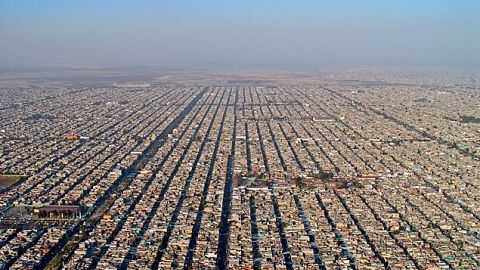The need to deny the global crisis of man, and place the enormity of present challenges to humanity in some partial and prior context, is extremely strong. It’s also the biggest impediment to facing and meeting the unprecedented crisis.
 Ordinary people leave such questions to the experts, but the experts, being fragmented themselves, add to humanity’s fragmentation by seeing the crisis in terms of their particular fields. That’s a vicious circle that prevents insight, understanding and action.
Ordinary people leave such questions to the experts, but the experts, being fragmented themselves, add to humanity’s fragmentation by seeing the crisis in terms of their particular fields. That’s a vicious circle that prevents insight, understanding and action.
“The conditions that sustain humanity are not natural and never have been,” inveighs Erle C. Ellis, a Harvard professor of geography and environmental systems. Let’s unpack that doozy.
What does “not natural” mean? Does it mean humankind is completely independent of nature, that “man is the measure of all things?” Or does it mean man operates in a way unlike any other species, outside the bounds of niche?
The former proposition, which Ellis embodies, is preposterous, since no matter how much man may alter the environment, we are ultimately dependent on nature, just as we arose from nature.
In humans nature evolved a new adaptive strategy, distinctly different from anything that had evolved before on this planet. That adaptive strategy involves separating things from their seamless context in nature and recombining them according to ideas and imagination generated by a brain evolved in and by nature.
The notion that what humans do is intrinsically separate from nature is therefore not only false; it is tragically ironic, turning the gift of utilitarian separation into the curse of psychological division.
In short, before and after the discovery and domestication of fire, nature endowed us with the mental apparatus to invent and develop technology, from crude cutting and chopping tools to high-speed computers.
But as the Greek myth indicates, man’s obdurate lack of insight into himself, and the Promethean gift of ‘higher thought’ with which nature endowed us, endangers the earth and enchains humankind to a destiny of separation from nature and the universe.
This should be obvious by now. Yet in an incredibly obtuse column entitled, “Overpopulation Is Not the  Problem” Ellis categorically states, “Our predecessors in the genus Homo used social hunting strategies and tools of stone and fire to extract more sustenance from landscapes than would otherwise be possible.”
Problem” Ellis categorically states, “Our predecessors in the genus Homo used social hunting strategies and tools of stone and fire to extract more sustenance from landscapes than would otherwise be possible.”
He goes on to pick numbers out of a hat, declaring: “The planet’s carrying capacity for prehistoric human hunter-gatherers was probably no more than 100 million.” 7.2 billion? No problem. 9 billion? Just another technological hurdle, which magnificent man will clear as he always has.
Driving his inane point home with all the subtlety of fingernails across a chalkboard, Ellis pronounces, “There really is no such thing as a human carrying capacity.” The disconnect between science and actuality, and between man and nature has never been more acutely (as in painfully) articulated.
This is truly disturbing and frightening stuff, and it has to be challenged and refuted at every level. At bottom, it is a worldview devoid of compassion, even as it whitewashes the increasing disparities of wealth, not to mention the quickening extinction of other species, by the truth wrapped in a lie that “there is no environmental reason for people to go hungry now or in the future.”
Besides a complete disregard for the decimation of other species that man is wreaking, and the spiritual and philosophical questions that such behavior by a sentient species poses, there is a tremendous existential irony in this worldview. And make no mistake, it is the prevailing worldview by scientists and technologists, not to mention most politicians and the rapacious global corporate interests they serve.
The irony is that the very evolutionary capability that gives us the ability to separate ‘things’ from nature and refashion them for our use, is what allows Ellis and his ilk to exhibit such complete disconnect from the earth.
 The basic view, which is both inwardly and outwardly very dark, is that the only environmental limits on man’s destructively extracting ways are the ones that humans determine “from the capabilities of our social systems and our technologies.”
The basic view, which is both inwardly and outwardly very dark, is that the only environmental limits on man’s destructively extracting ways are the ones that humans determine “from the capabilities of our social systems and our technologies.”
Adding insult to injury, such deniers of the human crisis declare those who attempt to address it are ‘doomsayers’: “The idea that humans must live within the natural environmental limits of our planet denies the realities of our entire history, and most likely the future.”
In other words, because we haven’t experienced a self-made global ecological collapse in the past, don’t worry, since “who knows what will be possible with the technologies of the future?”
Again, that’s absurd. Just because humankind hasn’t learned from self-made regional ecological collapses in the past (Easter Island for example, or the Mayan civilization) does not mean that a global ecological collapse in the present is not possible. Indeed, such a mentality makes it more likely every month.
Technology cannot stop us from effectively destroying the earth, wiping out over half the animal species on the planet during the ‘Anthropocene,’ or age of man, since the unwise use of technology is what has caused the crisis.
The consciousness of man, foolishly extolled by Ellis and his ilk, or blindly followed by the masses, can and must radically change. We will consciously awaken a new species, or we will destroy this beautiful planet, and the true potential of humanity.
The opening to the canyon, and the sloping ridgeline framing it on both sides, is smog-free and as clear as can be. An array of white cumulus hugs the tops of the hills, and rises in fantastic shapes thousands of feet into the azure sky.
The rows of monster houses built along the ridge and in front of the sentinel rock in the canyon are insignificant blights on the land. Man, including the man standing on the edge of town, recedes into near-nothingness, obliterated by the shock of beauty.
The human being is so much more than man, but like the ugly chrysalis, the human being can only emerge from self-knowing man and woman. Denying the ugliness of man precludes the beauty of the human being from emerging.
Martin LeFevre

